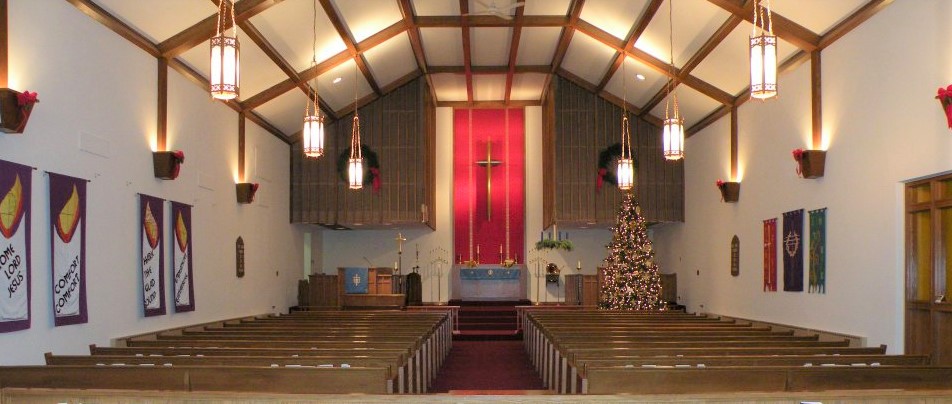June 7, 2020
Holy Trinity A 2020: Matthew 28:16-20
If you are expecting me to explain the mystery of the Holy Trinity on this Trinity Sunday, I have bad news for you. You might want to just take the next few minutes to go freshen up your coffee and come back in time for the prayers—I’ll never know. Matthew’s gospel for this morning tells us that Jesus commanded the eleven to go make disciples of all nations and baptize them in the name of the Father, and of the Son, and of the Holy Spirit—the clearest naming of God as Trinity in the Bible; but it’s entirely possible that even Jesus’ first followers didn’t have any clue what he was talking about when he described God in three persons. It took the early church a few hundred more years to nail down the credal descriptions of the Triune God. But this passage has so much more to say to us than the doctrine that God is Trinity. This tiny bit of scripture makes perhaps the most profound promise we find in the whole Bible, gives us the most specific instructions of God’s expectations for us, and shows us what it means to be a disciple of Jesus, the human revelation of God.
Each gospel tells a different story of what happens after Jesus’ resurrection. In other versions, the women are afraid to say they’ve seen Jesus; or the disciples don’t believe the women and think they are telling an “idle tale”; or they run to the tomb themselves for proof. But here in Matthew’s gospel, Jesus instructs the women to tell the disciples to go to Galilee, and they go. The disciples listen to the women who were usually ignored, and they believe that God has spoken to them. The eleven never would have gotten to this mountain to encounter Jesus if they had not listened to the often excluded voices of the women. Disciples of Jesus believe that God speaks through people of less influence and status. Can you imagine how much more like the kingdom of God our world would look today if those in positions of privilege and power listened to the words of the marginalized?
When the disciples see Jesus, they worship him and doubt. This wasn’t an either/or distinction, but doubt coexisted with worship, even for the disciples who had spent years with Jesus. Doubt does not exclude us from being people of faith; in many ways, the more we struggle with doubt in conversation with one another and with God, the deeper our faith grows. Disciples worship, and doubt, and that’s OK.
Because right after we read about the disciples doubting, we hear Jesus promise, “I am with you always, to the end of the age.” He made that promise to them after they responded to him in doubt. Unquestioning, immovable, iron-clad faith is not the prerequisite for God’s presence in our lives. Jesus assured the disciples of God’s presence after, maybe even because of their doubt. Because they were going to need the power of the most high in their lives for the work that they had been given to do—going into all nations, baptizing, and teaching everything that Jesus had commanded. If the risen Jesus was standing in front of them and they doubted, imagine how much more they would doubt their mission, their abilities, their effectiveness as they tried to engage all the world in following the teachings of Jesus, teachings which, after all, were so countercultural, they got Jesus killed. Jesus promises the disciples that they do not have to undertake this mammoth task without divine help. And we know that even though Matthew stops writing here, the disciples do trust Jesus to deliver on that promise, because the rest of the New Testament describes them doing what he has commanded them.
This passage of scripture is traditionally referred to as the Great Commission, but during bible study this week I mentioned that some Christian writers have dubbed this the Great Omission, because sometimes the church strays from this clearly stated mission of making disciples, baptizing, and teaching Jesus’ commands—or else we don’t think critically about how we are doing this. I just finished catching up on Grey’s Anatomy, the series about a Seattle teaching hospital. One character’s philosophy of training surgeons in how to perform procedures is “watch one, do one, teach one” and I wonder if that’s not the best plan for what Jesus commands us to do. After all, we had to see someone living out the love of Jesus to draw us into a life of discipleship. And we can’t really teach that to others if we haven’t first lived that way ourselves, because why would anyone sign on to obey everything Jesus commanded: loving our neighbors as ourselves, loving our enemies, being a servant, cutting off the parts of our lives that cause us to sin…why would anyone believe us when we tell them to do that if we haven’t first shown them how that has transformed our lives for good?
Jesus’ promise to be with us always to the end of the age is good news as we look around at a frightening world where God’s kingdom is obstructed by violence, racism, division, pandemic, and at best a disregard, at worst an outright assault on the dignity and very life of others. But that promise is not only given to us so that we can find our own value in being created by God or our own freedom in being saved by God. That promise is made to us so that we know we will be sustained by God as we do the hard work of living lives that teach the world God’s way of mercy, justice, compassion, and radically selfless love. Let us go therefore and do what we have been commanded, knowing that God, Father, Son, and Holy Spirit, Creator, Redeemer, and Sustainer, is with us as we go.

